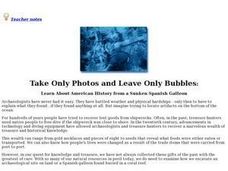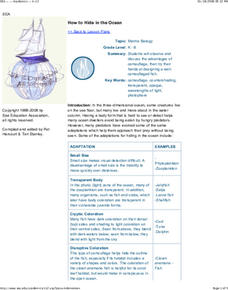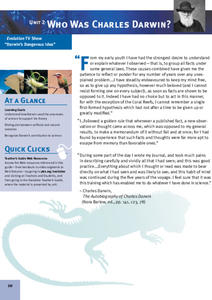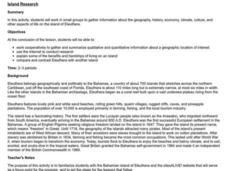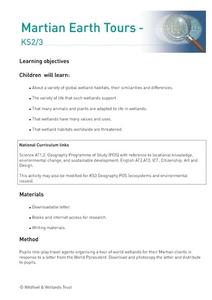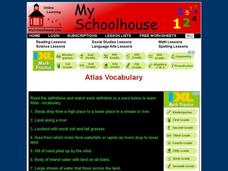Curated OER
No Escape
Via four student handouts, marine biology learners examine the topography and circulation cell of the Fieberilng guyot. Then they examine the number of individual hydroids counted at each depth. Pupils use the information to relate water...
Curated OER
Friendly Volcanoes
Students discuss the benefits of volcanic activity on marine life. They explain the process of tectonic plates.
Curated OER
Abiotic and Biotic Factors
Students examine abiotic and biotic factors. They define biotic and abiotic, categorize a list of items onto a Venn diagram, label various items from areas on the school grounds as biotic or abiotic, and diagram a magazine picture.
Curated OER
Something Fishy Going On
Students create a video animation of how Swimmy gathered his fish friends together to form a great big fish that would frighten the predator tuna away. In art class each child create a small red fish which gets displayed in the ocean...
Curated OER
Take Only Photos and Leave Only Bubbles: Learn About American History from a Sunken Spanish Galleon
Young scholars simulate the research process of investigating a shipwreck. In small groups, they conduct Internet research, and develop and write a proposal for excavation of the archaeological site.
Curated OER
Sharks At Risk Viewing Guide
Young scholars complete a worksheet while viewing a film about sharks. They examine the reasons for overfishing of the oceans. They identify predator-prey relationships as well.
Curated OER
How to Hide in the Ocean
Students observe the advantages of camouflage. They design a well camouflaged fish of their own.
Curated OER
Who Was Charles Darwin?
Learners examine how Darwin used the processes of science to support his theory. They distinguish between artificial and natural selection, recognize Darwin's contribution to science. They produce a newspaper describing the times in...
Curated OER
Water Creative Writing
Learners red and discuss an example of a biographical essay. They read The Last of the Falling Tide by Car Hiassen, answer factual questions concerning the work, and create their own story about a natural place they are familiar with ,...
Curated OER
Island Research
Young scholars will work in small groups to gather information about the geography, history, economy, climate, culture, and other aspects of life on the island of Eleuthera. Lesson contains adaptations for all levels.
Curated OER
'Round and 'Round it Goes!
Students discuss and interpret background knowledge on poster copy given on the water cycle. Students complete the included activity sheets using the poster as a reference in small groups. Students identify and name where water can be...
Curated OER
Martian Earth Tours
Students study a variety of global wetland habitats, their similarities and differences. They examine the variety of life that such wetlands support and determine that many animals and plants are adapted to life in wetlands, that...
Curated OER
Investigation 3 - Weathering
Fourth graders study 4 types of weather processes: wind, running water, plant growth, and freezing water. They explain how the processes of weathering and erosion change and move materials that become soil. They draw diagrams...
Curated OER
Ecosystem Interdependence
Learners outline a scenario demonstrating ecosystem interdependence. They explain the effects of this change according to the food web. They give a positive example such as increased rain and have the students call out answers to your...
Curated OER
Ultraviolet Reflections
In this environment worksheet, students distinguish between UV-A, UV-B, and UV-C radiation and explain. Then they list various explanations of the source of ozone depletion. Students also describe why an increase in smog ozone does not...
Curated OER
Dolphins At Daybreak
In this reading literature comprehension activity, students complete 35 questions. There is a short crossword puzzle, short answer responses, and matching. All pertain to Dolphins at Daybreak
Curated OER
Life Cycle: Diversity in a Balance
In this life cycle workbook, 3rd graders complete several different activities in which they analyze different invertebrates, identify arthropods, examine human biology and plants, and study natural environments. 20 different activities...
Curated OER
Invertebrate Vocabulary-- Marine Invertebrate Match
In this science worksheet, students study 12 vocabulary words which pertain to marine invertebrates. Students read the definitions which include pronunciation, part of speech and meaning of the name. Students then look at 16 organisms...
Curated OER
Sprinkles 5
For this environment worksheet, students read the information and complete the survey about their own local habitats and some of the others in Florida.
Curated OER
Make Words
In this making words worksheet, learners make at least thirty-six English words from the letter found in the word butterfly fish only.
Curated OER
Activity Two: The Classic Fossil Lab-Simple Format
For this fossil worksheet, students are given a bag of fossils to identify. They use a key and a worksheet with pictures of the various types of fossils. They answer questions about fossils and use a web site to find out if their state...
Curated OER
Fossil Lab
In this fossil activity, students are given fossils and an identification key. They write their scientific names and common names. They also answer questions about fossils.
Curated OER
Cnidarians Crossword Puzzle
In this crossword puzzle about Cnidarians worksheet, 6th graders write examples, words being defined, parts of the Cnidarians, and kinds of Cnidarians to complete the crossword puzzle review. Students write seventeen answers..
Curated OER
Atlas Vocabulary
In this atlas terms and definitions online interactive worksheet, students read the definitions and match them with Atlas vocabulary words. Students match 49 answers.
Other popular searches
- Coral Reefs
- Coral Reef Worksheets
- Coral Reef Food Chain
- Coral Reefs Coloring Pages
- Coral Reef Biology
- Coral Reef Art
- Coral Polyps
- Coral Reef Ecosystem
- Coral Reef Lesson Plans
- Coral Reef Bleaching
- Coral Reef Habitat
- Coral Communities






